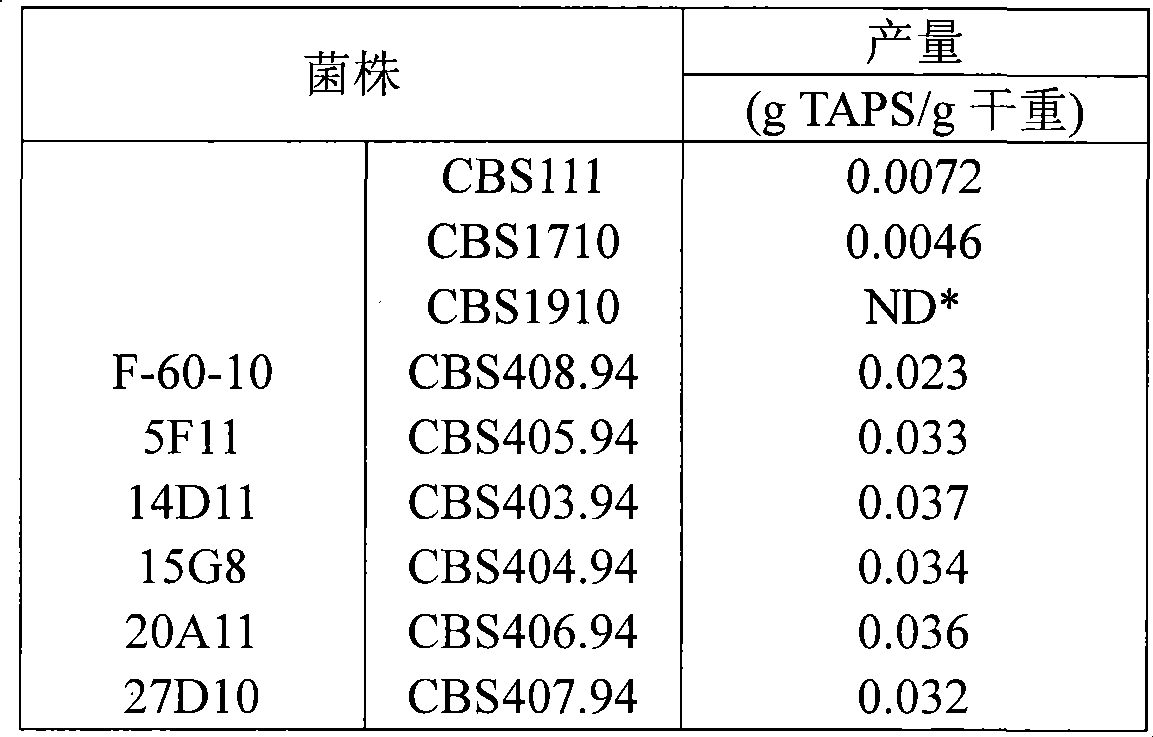Microbial bacterial strain for producing sphingolipid alkali
A strain, the technology of Pichia pastoris, applied in the direction of microorganisms, methods based on microorganisms, treatment of microorganisms with electricity/wave energy, etc., can solve problems such as limitations
- Summary
- Abstract
- Description
- Claims
- Application Information
AI Technical Summary
Problems solved by technology
Method used
Image
Examples
preparation Embodiment A
[0031] Preparation Example A: Preparation of Tetraacetylphytosphingosine Standards
[0032] A mixture of 1.0 g (2.8 mmol) phytosphingosine hydrochloride (Sigma), 2.7 ml (28 mmol) acetic anhydride, 2.1 ml (15 mmol) triethylamine and 10 ml pure chloroform was heated at reflux and stirred for 8 hours. After cooling to room temperature, the mixture was washed with a saturated aqueous solution of sodium bicarbonate until a pH of 7 was reached. The organic layer was then heated at 50 °C in MgSO 4 Dry over, filter and evaporate in vacuo. The residue was purified by column chromatography using a Merck: Lobor Fertich Saule GroBec (440-37) Lichroprep Si60 (40-60 μm) column. A mixture of dichloromethane and methanol (25:1) was used as eluent (aspiration speed of 10 ml / min). The obtained product is a white solid with a yield of 80% and a melting point of 41-43°C. The purity of the TAPS thus formed was in the range of CDCl 3 The purity was estimated to be 96% as determined by NMR (pro...
preparation Embodiment B
[0034] Preparation Example B: TAPS agar medium slant
[0035] 122 g of Nemoutex (Diastatische Produkten B.V.; Leiden, The Netherlands) were dissolved in 1 liter of water and sterilized at 110° C. for 60 minutes. The suspension was incubated overnight at room temperature and filtered to remove solid particles. The pH balance was at 6.4. 10 g / l agar (Bacto) was added and the solution was sterilized at 120°C for 30 minutes.
preparation Embodiment C
[0036] Preparation Example C: TAPS medium (for test tube culture and shake flask culture)
[0037] compound Quantity (g / l) KH-phthalic acid
NaCl
MgSO 4· 7H 2 o
CaCl 2· 2H 2 o
NH 4 Cl
K H 2 PO 4
(NH 4 ) 2 Fe(SO 4 ) 2
ZnSO 4
CuSO 4
MnSO 4
h 3 BO 3
K1
Ca-D-panthotenate
Vitamin B1
p-amino benzoate vitamin
Vitamin B6
Yeast extract (Difco) 20
0.06
0.88
0.20
4.83
1.0
0.027
0.005
0.0075
0.0006
0.0006
0.0006
0.00015
0.059
0.003
0.003
0.003
0.002
0.0003
0.00001
1.0
[0038] In shake flasks and culture tubes, glucose was added to a final concentration of 33 and 7 g / l, respectively. After the ingredients were dissolved, the pH was adjusted to 5.4.
[0039] Add 30ml of culture medium into a 100ml Erlenmeyer flask (without baffle), and sterilize at 110°C for 30 m...
PUM
 Login to View More
Login to View More Abstract
Description
Claims
Application Information
 Login to View More
Login to View More - R&D
- Intellectual Property
- Life Sciences
- Materials
- Tech Scout
- Unparalleled Data Quality
- Higher Quality Content
- 60% Fewer Hallucinations
Browse by: Latest US Patents, China's latest patents, Technical Efficacy Thesaurus, Application Domain, Technology Topic, Popular Technical Reports.
© 2025 PatSnap. All rights reserved.Legal|Privacy policy|Modern Slavery Act Transparency Statement|Sitemap|About US| Contact US: help@patsnap.com



